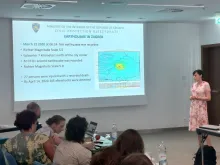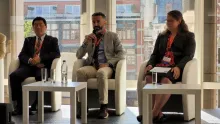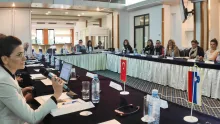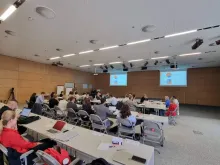 Threats and dangers that Chemical, Biological, Radiological and Nuclear (CBRN) materials pose are a challenging issue to be handled by all countries. CBRN substances can be deliberately and accidently released to the environment. Moreover, political disturbances and developing industrial activities increase the risk of release of those substances. CBRN incidents can result in economic, political and social losses at national and global level and can cause severe permanent damage to environment and human health.
Threats and dangers that Chemical, Biological, Radiological and Nuclear (CBRN) materials pose are a challenging issue to be handled by all countries. CBRN substances can be deliberately and accidently released to the environment. Moreover, political disturbances and developing industrial activities increase the risk of release of those substances. CBRN incidents can result in economic, political and social losses at national and global level and can cause severe permanent damage to environment and human health.
 The event, hosted by the Republic of Turkey, Prime Ministry Disaster and Emergency Management Presidency (AFAD) as one of the Turkish contributions to the DPPI SEE Disaster Management Training Programme for 2015, aimed to provide an opportunity for information exchange among the DPPI SEE member countries on best practices and lessons learned in the area of CBRN preparedness, response and recovery activities including about related education, training, public awareness, etc.
The event, hosted by the Republic of Turkey, Prime Ministry Disaster and Emergency Management Presidency (AFAD) as one of the Turkish contributions to the DPPI SEE Disaster Management Training Programme for 2015, aimed to provide an opportunity for information exchange among the DPPI SEE member countries on best practices and lessons learned in the area of CBRN preparedness, response and recovery activities including about related education, training, public awareness, etc.
Target audience of the event were CBRN specialists, first responders, instructors/trainers, or professionals involved in developing CBRN emergency-response system in their countries.
 Within the seminar part, country presentations were expected to inform about their respective national CBRN management systems, such as:
Within the seminar part, country presentations were expected to inform about their respective national CBRN management systems, such as:
- CBRN emergency management planning (organizational structure, CBRN teams structure)
- Standard operation procedures of CBRN incident response (surveillance and reconnaissance, detection, sampling, search and rescue, decontamination)
- Practical and theoretical training activities
- Public awareness and communication activities
- Early warning systems
Workshop, on the other hand, aimed at identifying the key differences between the participating countries’ CBRN governance systems thereby forming the basis for discussion on the importance of establishing a common language in the region of the South Eastern Europe.
In addition to a number of AFAD’s representatives, 11 participants from six (6) other DPPI SEE member countries (Albania, Croatia, Macedonia, Montenegro, Serbia and Slovenia) took part in the event.
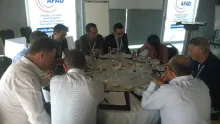
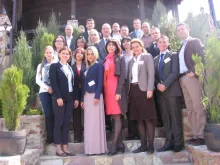
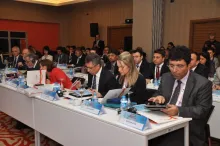
 there were 4.309 disasters recorded, resulting from natural hazards around the world where 1.124.854 people perished and a minimum of 1.313 billion USD was recorded in losses. In the year 2011 alone, 365 disasters claimed 33.760 lives; affected 206 million people and inflicted damages worth an estimated 366 billion USD.
there were 4.309 disasters recorded, resulting from natural hazards around the world where 1.124.854 people perished and a minimum of 1.313 billion USD was recorded in losses. In the year 2011 alone, 365 disasters claimed 33.760 lives; affected 206 million people and inflicted damages worth an estimated 366 billion USD.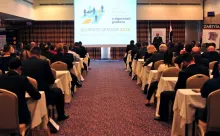
 Meridien Lav Hotel in Split, Croatia, from 19 to 21 March 2014. The conference was organized by Security (Zaštita) Magazine (Tectus Ltd. Company) and the Croatian Network of Urban Security Stakeholders (CNUSS) under the auspices of the Ministry of Interior of the Republic of Croatia and the City of Split in cooperation with the Croatian Security Association, National Protection and Rescue Directorate (DUZS) and Association of Cities.
Meridien Lav Hotel in Split, Croatia, from 19 to 21 March 2014. The conference was organized by Security (Zaštita) Magazine (Tectus Ltd. Company) and the Croatian Network of Urban Security Stakeholders (CNUSS) under the auspices of the Ministry of Interior of the Republic of Croatia and the City of Split in cooperation with the Croatian Security Association, National Protection and Rescue Directorate (DUZS) and Association of Cities.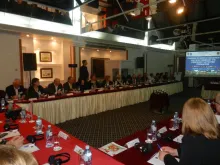
 2014 and was hosted by the Sector for Emergency Management of the Ministry of Interior of the Republic of Serbia.
2014 and was hosted by the Sector for Emergency Management of the Ministry of Interior of the Republic of Serbia.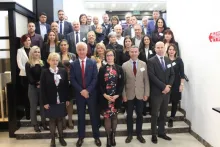
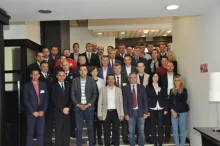

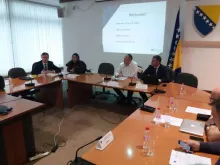
 During 05-06.03.2019 DPPI SEE Secretariat hosted the first event from the annual Disaster Management Training Program in Sarajevo, Bosnia and Herzegovina. Together with UNISDR Europe office, training workshop has been conducted on Sendai Framework Monitoring process. Total number of 17 participants from all DPPI SEE member states had the opportunity to learn about the recent developments related with Sendai Framework Monitoring process, to exchange on their national experiences and to practice some of the online training tools available for Sendai Framework Monitoring. Detailed report on the workshop together with all the presentations from the training workshop will be uploaded on our web page in the following days. DPPI SEE Secretariat express its gratitude to the Ministry of Security of Bosnia and Herzegovina - Sector for rescue and protection for their support in organizing this event.
During 05-06.03.2019 DPPI SEE Secretariat hosted the first event from the annual Disaster Management Training Program in Sarajevo, Bosnia and Herzegovina. Together with UNISDR Europe office, training workshop has been conducted on Sendai Framework Monitoring process. Total number of 17 participants from all DPPI SEE member states had the opportunity to learn about the recent developments related with Sendai Framework Monitoring process, to exchange on their national experiences and to practice some of the online training tools available for Sendai Framework Monitoring. Detailed report on the workshop together with all the presentations from the training workshop will be uploaded on our web page in the following days. DPPI SEE Secretariat express its gratitude to the Ministry of Security of Bosnia and Herzegovina - Sector for rescue and protection for their support in organizing this event. 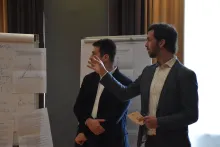
 DPPI SEE and IPA DRAM partner countries came to Ljubljana this week to discuss the possibility for sustainability of results upon the end of IPA DRAM in November 2019. IPA DRAM has identified five main areas in which the programme results can be sustained and at the same time contribute to the strengthening of DPPI SEE. Those five areas are:
DPPI SEE and IPA DRAM partner countries came to Ljubljana this week to discuss the possibility for sustainability of results upon the end of IPA DRAM in November 2019. IPA DRAM has identified five main areas in which the programme results can be sustained and at the same time contribute to the strengthening of DPPI SEE. Those five areas are:
 For the purpose of this workshop the organizational comparative advantage methodology was used. This methodology facilitates the process of performing systematic analysis of internal and external factors that affect an organizations ability to take new task,projects or objectives as well as identifying the resources that would be required should the
For the purpose of this workshop the organizational comparative advantage methodology was used. This methodology facilitates the process of performing systematic analysis of internal and external factors that affect an organizations ability to take new task,projects or objectives as well as identifying the resources that would be required should the  By working in 3 groups participants of the workshop have analyzed all of the 5 recommended IPA DRAM results. The report which will be the outcome from the workshop will include the findings of the analysis and will draft recommendations to be taken under consideration during the upcoming 38.DPPI SEE Regional Meeting in Tirana (16-17.04.2019).
By working in 3 groups participants of the workshop have analyzed all of the 5 recommended IPA DRAM results. The report which will be the outcome from the workshop will include the findings of the analysis and will draft recommendations to be taken under consideration during the upcoming 38.DPPI SEE Regional Meeting in Tirana (16-17.04.2019).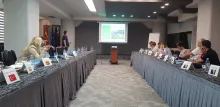
 The event was part of this year Republic of Macedonia contribution to the Disaster Management Training Programme of DPPI SEE and was organized by the Protection and Rescue Directorate of the Republic North Macedonia and the Private Medical Centre Adzi Badem Sistina in Skopje.
The event was part of this year Republic of Macedonia contribution to the Disaster Management Training Programme of DPPI SEE and was organized by the Protection and Rescue Directorate of the Republic North Macedonia and the Private Medical Centre Adzi Badem Sistina in Skopje. The objective of the event was to share knowledge among DPPI SEE member states about hospital emergency preparedness in cases of earthquakes and promote public private partnerships in the area of disaster risk management. DPPI SEE members states had the opportunity to observe one day practical exercise for patient evacuation after an earthquake at the Private Medical Centre Adzi Badem Sistina in Skopje.
The objective of the event was to share knowledge among DPPI SEE member states about hospital emergency preparedness in cases of earthquakes and promote public private partnerships in the area of disaster risk management. DPPI SEE members states had the opportunity to observe one day practical exercise for patient evacuation after an earthquake at the Private Medical Centre Adzi Badem Sistina in Skopje.
 Based on the invitation from the General Inspectorate for Emergency Situations (GIES) to the Member States of Disaster Pareparedness and Prevention Initiative for South Eastern Europe (DPPI SEE), representatives of DPPI SEE together with a delegation of GIES attended the International Conference on Environmental Legislation, Safety Engineering and Disaster Management - ELSEDIMA, in Cluj Napoca, 17-18 May 2018.
Based on the invitation from the General Inspectorate for Emergency Situations (GIES) to the Member States of Disaster Pareparedness and Prevention Initiative for South Eastern Europe (DPPI SEE), representatives of DPPI SEE together with a delegation of GIES attended the International Conference on Environmental Legislation, Safety Engineering and Disaster Management - ELSEDIMA, in Cluj Napoca, 17-18 May 2018. This activity represented Romania's contribution to 2018 Disaster Management Training Program under DPPI SEE, attended by 11 representatives from Albania, Bosnia Herzegovina, Bulgaria, Macedonia, Montenegro, Romania and Head of the DPPI SEE Secretariat .
This activity represented Romania's contribution to 2018 Disaster Management Training Program under DPPI SEE, attended by 11 representatives from Albania, Bosnia Herzegovina, Bulgaria, Macedonia, Montenegro, Romania and Head of the DPPI SEE Secretariat . GIES leadership has been represented by First Deputy General Inspector - Colonel Daniel Marian DRAGNE and Lieutenant Colonel Rareş PETRE, European Affairs, Assistance and International Relations Service, responsible officer for DPPI SEE cooperation.
GIES leadership has been represented by First Deputy General Inspector - Colonel Daniel Marian DRAGNE and Lieutenant Colonel Rareş PETRE, European Affairs, Assistance and International Relations Service, responsible officer for DPPI SEE cooperation.